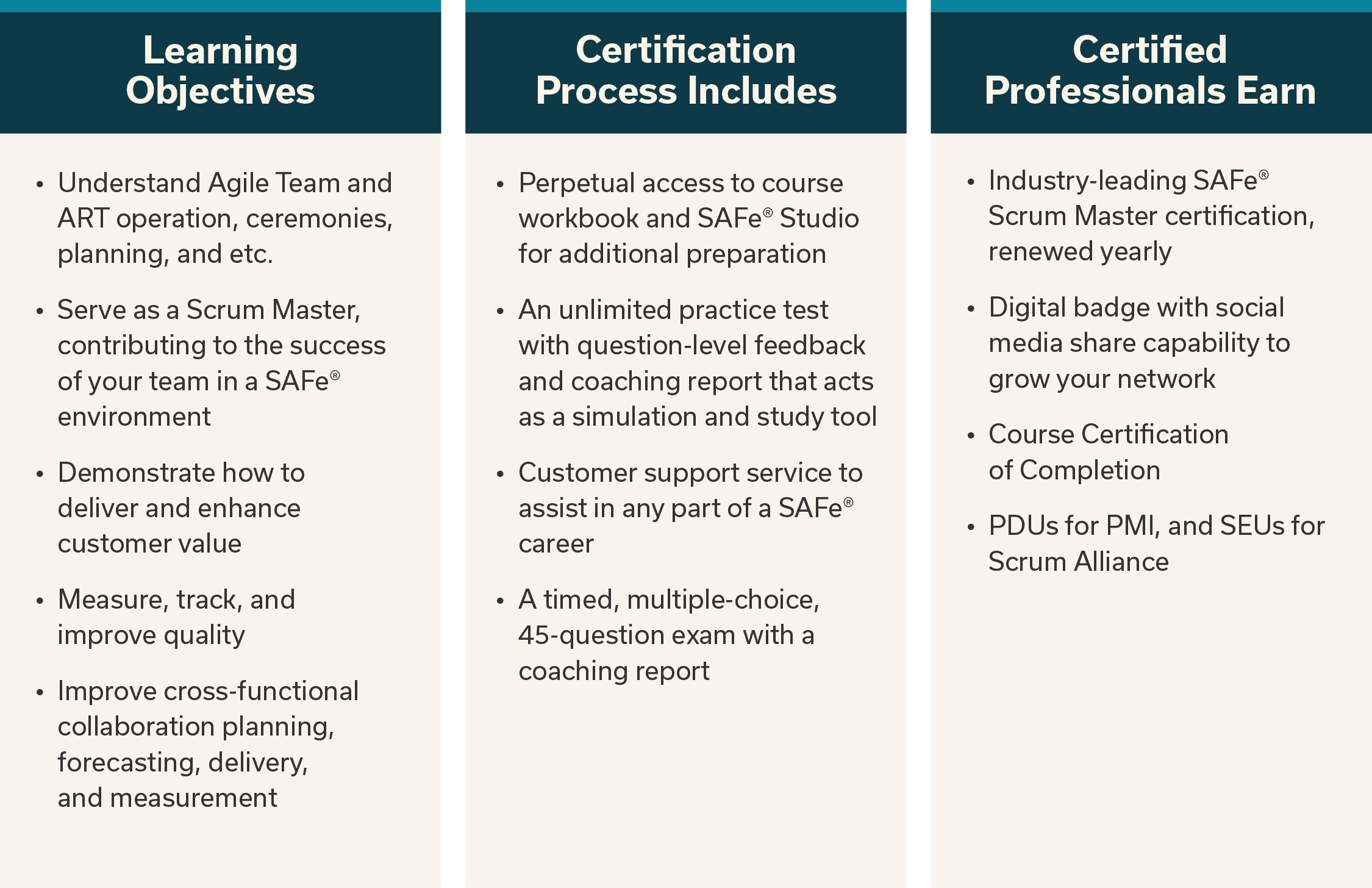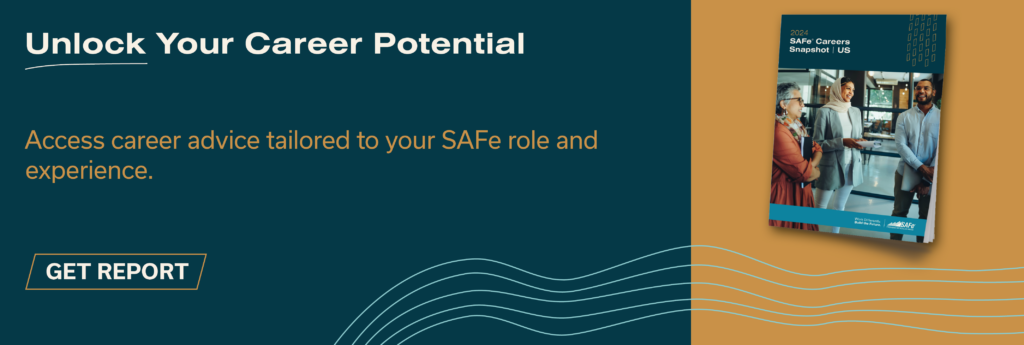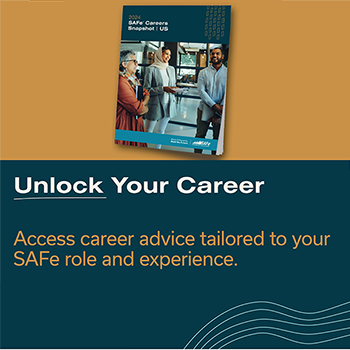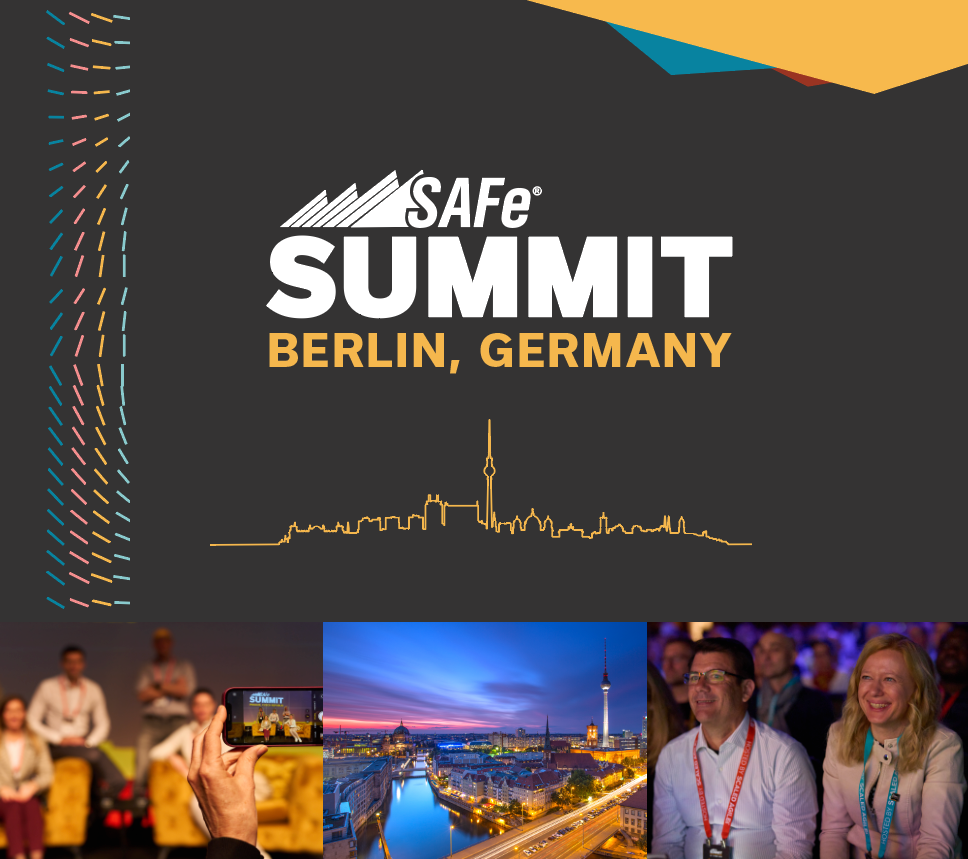If you’re considering SAFe® certification, this guide is for you. We go in-depth on the most frequently asked questions about SAFe certification, including what it is, why it’s valuable for professionals and teams, and how to earn one.
In this post, you’ll find answers to SAFe certification questions like the following:
- What is SAFe certification?
- What is the value of SAFe certification?
- How do I earn a SAFe certification?
- How much does SAFe certification cost?
- How long does it take to earn a Scaled Agile certification?
- How long will my Scaled Agile certification remain valid?
- Is SAFe certification just for IT or software professionals?
- What do I get with SAFe certification?
- How should I choose the right SAFe certification for me?
- How do I pick the right training provider?
What Is SAFe® Certification?
SAFe certification is the achievement you earn after taking a class and passing the related examination. Upon completion, you’ll also receive a SAFe certification badge.
Scaled Agile offers the only reliable and valid SAFe certifications using assessment-driven standards. Our courses are taught by a global network of training providers and transformation partners that set you up for a successful SAFe journey.
To help along the way, we provide a comprehensive exam study guide and practice test so you can study and familiarize yourself with the layout of our closed-book assessments.
Each assessment is guided by internal and external Subject Matter Experts (SMEs) who write, edit, and review each question to ensure its relevance to SAFe courses and the Framework.
You have 30 days upon class completion to take the exam. If you need more time, you can use a one-time, self-service exam extension. However, we recommend taking the exam as close to 30 days as possible for a higher chance of success. This recommendation is based on certification research that shows information is best used to test during the first month of its retention.
“SAFe has propelled my career exponentially”
—Aishwarya Radhakrishnan, SPC at Deloitte
What’s the difference between SAFe certifications, courses, and classes?
SAFe has many different learning solutions, and we’ve identified three of the most popular options.
- SAFe certification: The badge you receive once you complete a SAFe course and pass a SAFe certification exam
- SAFe courses: The start to finish experience that results in earning a SAFe certification badge; for example, for a Leading SAFe course, this includes a SAFe class, certification exam, and certification badge, or for an Advanced Facilitator course, this includes the pre-class e-learning, class, and digital badge
- SAFe classes: The live training, offered either publicly or privately by Scaled Agile or our partners; there are many options for timezones, locations, languages, and more on our public training calendar
What Is the Value of SAFe Certification?
The value of a SAFe certification goes beyond the shareable badge and new knowledge, skills, and abilities.
A SAFe certification sets your skills apart and gives you a globally known certification that can amplify you in the workforce. According to Coursera and CIO.org, SAFe certification is one of the top Agile certifications in 2024.
Additionally, a SAFe certification can:
- Propel your career
- Provide a network of over 1,000,000 SAFe individuals looking to increase their SAFe knowledge
- Elevate your resume in an ever-changing marketplace
- Communicate your skills to a global community
Do employers require certification?
If you plan to work at an organization practicing SAFe, they’ll likely require a SAFe certification. Based on our research for the 2024 Careers Snapshot, we found that 62 percent of open SAFe roles required certifications, with others listing certification as strongly preferred.
Because SAFe courses and exams cover Agile ways of working, SAFe certifications are useful in any Agile organization.
Can I earn more with a SAFe certification?
Research for the SAFe Careers Snapshot revealed that SAFe employers showed salary levels of 4,000 – 32,000 USD higher than national averages for comparative roles. We also found that SAFe hires can increase their salary by up to 40,000 USD by accruing years of experience, skills, and certifications.
Can I advance in my job?
SAFe roles facilitate career progression. Junior roles serve as a training ground for senior positions. And, since SAFe roles work cross-functionally, individuals are exposed to more business areas, which cultivates broader insights and expertise over time.
Indeed, Coursera, and other career sites recommend SAFe certification as one of the most valuable ways to advance professionally.
Are SAFe certifications recognized globally?
Yes, SAFe certifications are recognized globally. Scaled Agile’s certification program is globally recognized as the premier way to demonstrate the knowledge and skills needed to successfully achieve business agility.
SAFe adoption is growing rapidly worldwide. 70 percent of Fortune 100 companies and a growing number of the Global 2000 have certified SAFe professionals and consultants on-site, and over 1,400,000 practitioners have been trained to date.
SAFe course attendees are helping to lead digital transformations at large enterprises. When you sign up for a SAFe class, you’re given the opportunity to learn alongside a distinctive professional group.
Does the learning apply beyond SAFe?
Yes, the skills and knowledge you acquire in your SAFe course apply to Agile practices anywhere, even in non-SAFe contexts.
Small batch sizes, customer-centric prioritization, and decentralized decision-making, which are principles of working in a SAFe environment, are also tenets of an energized and engaged organization in any industry or context.

How Do I Earn a SAFe Certification?
The first step in earning a SAFe certification is determining which course is right for you. Your decision will likely depend on several factors, including:
- Prior experience in similar roles
- Total years of experience
- Familiarity with SAFe and Agile
- Desired role or opportunities
- Your organization’s implementation stage and process
Our comprehensive training calendar offers a list of all classes happening worldwide.
Once you’ve decided which course is right for you, you can sign up through this calendar. Each course has an exam study guide, an unlimited practice test, and a single certification exam.
When you pass your exam, you become a member of the SAFe community, which includes perks like access to SAFe Studio.

Do I need to take a course to earn a SAFe certification?
Yes, you need to take a class and pass the corresponding exam to earn a SAFe certification. You can see a list of courses and corresponding certifications here. Certification exams have different passing scores depending on the level of content.
Where should I start?
We’ve created a form to help you determine which SAFe course is right for you. Take into account your role, goals, business, and SAFe experience.

From there, use the training calendar to find a SAFe class that fits your schedule and training needs.
How can Scaled Agile help?
You can start your search on our website. You’ll also find a host of helpful resources, from a verified partner finder to guides on how to pass your exam.
How Much Does SAFe Certification Cost?
The cost of SAFe certification varies depending on where it’s held, if it’s in-person or virtual, and who teaches the class. However, these are averages based on recent prices to give you an idea:
- SAFe® Agilist (SA) certification: 714 USD
- SAFe® Practitioner (SP) certification: 538 USD
- SAFe® Scrum Master (SSM) certification: 674 USD
- SAFe® Product Owner/Product Manager (POPM) certification: 674 USD
- SAFe® Advanced Scrum Master (SASM) certification: 804 USD
- SAFe® Release Train Engineer (RTE) certification: 2,347 USD
Please note that these prices are averages and will vary based on location, training provider, and any additional materials or support provided. It’s always good to check with specific training providers for the most accurate pricing information.
If you take the certification exam within 30 days of the class, it is included in the cost of the course. If you take the exam outside the 30-day window or require a retake, it will cost an additional 50 USD for most courses (the SAFe® Practice Consultant retake is 250 USD).
How Long Does It Take to Earn a Scaled Agile Certification?
It can take one week to one month to earn a Scaled Agile certification. Classes vary in length from two to four days in total. Once your class is complete, the certification material is unlocked.
Are courses offered online and in person?
Classes are offered both online and in person. You can sort classes by delivery method (virtual or in-person) on our training calendar.
How long are the courses?
Most courses are two days, while a few are three or four. These timelines can vary based on who’s offering the course and whether it covers advanced content.
Is exam prep lengthy?
Upon class completion, the exam study guide and practice test will be available for you to familiarize yourself with the assessment format and the exam blueprint.
From there, taking the exam is up to you. You will have 30 days to take it. We recommend taking your exam as soon as you are ready so all of the newly attained information is fresh and ready to test.
“It’s been incredibly rewarding to witness the positive transformation and the delivery of high-quality products at a faster pace, all supported by the principles and practices of SAFe.”
—Ashar Javaid, SAFe Scrum
Master Agilist Team Lead at iCareManager
How Long Will My Scaled Agile Certification Remain Valid?
Your certification is renewed annually. Once you receive your SAFe certification, it’s important to keep it valid and up-to-date.
You can do this by:
- Upgrading to the latest version of SAFe
- Completing professional development via online learning in SAFe Studio
- Renewing your certification yearly (one fee covers all certifications in each category)
Why are there different certification versions like 5, 5.1, and 6?
Each time we release a new version of the Scaled Agile Framework, we release upgrades for certification. This shows you are current with the latest version of SAFe. It’s important to stay active in the SAFe community, so you know when a new version of SAFe will be released.
Is SAFe Certification Just for IT or Software Professionals?
No, SAFe certification has many benefits for any professional. Once you have a SAFe certification, your professional capabilities and network expand, enabling you to work with professionals across teams and disciplines.
Though Agile certifications were originally developed primarily for software development teams, they are now used more broadly across the business.
SAFe has begun extending to full-business applications in finance, insurance, education, marketing, and more.
What Do I Get with SAFe Certification?
You get more than a certification when you become SAFe-certified. You also get:
- 12 months of valid certification
- A digital badge that can be shared with your network
- Access to SAFe Studio, exclusive content, and member-only events
- Access to learning plan material
- Professional distinction and credibility



“Most of the high-performing and self-aware teams I’ve worked with were built on SAFe. The more involved the organization was, the better the performance and output.”
—Neha Mehta, New Services Development & Strategy Manager at KPMG Global Services
How Should I Choose the Right SAFe Certification for Me?
Each SAFe journey is unique, so it’s important to keep your goals in mind when selecting your SAFe certifications. Below we’ve outlined our suggestions, but they’re all customizable to your specific needs and career visions.
Is there an order in which to achieve SAFe certification?
The order in which you achieve your SAFe certifications depends on your unique journey. However, there are general guidelines for understanding where to start your certification journey and how to advance to new roles and responsibilities.
Leading SAFe® and SAFe® for Teams are foundational introductory courses. Then you can acquire more advanced certifications as you seek further expertise in a particular role, discipline, or skillset.
For example, for more advanced facilitation skills and knowledge in SAFe, we recommend the SAFe® Scrum Master course. You could then progress to the SAFe® Advanced Scrum Master or SAFe® Release Train Engineer course.
Those working in Product will typically start with the SAFe® Product Owner/Product Manager course, which can then lead to the Agile Product Management course. The SAFe® Architect course is also available for this area of expertise.
For more information on SAFe roles and progression, check out the SAFe Careers Snapshot.
Is there a complete list of Scaled Agile Framework certifications?
- SAFe® Advanced Scrum Master
- SAFe® Agile Product Manager
- SAFe® Agilist
- SAFe® Architect
- SAFe® DevOps Practitioner
- SAFe® Lean Portfolio Manager
- SAFe® Practice Consultant
- SAFe® Practice Consultant-T [for those qualified to teach other SAFe Practice Consultants]
- SAFe® Practitioner
- SAFe® Product Owner/Product Manager
- SAFe® Release Train Engineer
- SAFe® Scrum Master
| Objective | New to SAFe? | Advance Your Career | Ready to Lead |
|---|---|---|---|
| Learn about SAFe | – SAFe® Practitioner – SAFe® Agilist | – Agile Product Manager – Lean Portfolio Manager – SAFe® DevOps Practitioner | – SAFe® Practice Consultant |
| Claim a Role | – SAFe® Scrum Master – SAFe® Product Owner/Product Manager | – SAFe® Release Train Engineer – SAFe® Architect | – SAFe® Practice Consultant – SAFe® Practice Consultant-T |
How Do I Pick the Right Training Provider?
Our training providers are part of an esteemed partner network committed to driving customer success by providing training and coaching for all SAFe roles. Your considerations will likely include the following: languages available, in-person or remote, training availability, regionality, cost, and more.
Which class is right for me?
There are many training providers to choose from, so we’ve included information about each class on our training calendar.
Once you click on a class you’re interested in, you’ll see information about the provider.

This includes:
- How many public classes they’ve taught (meaning classes not taught within a private enterprise)
- Average class size
- Run rate
- Average feedback score
- Information about the instructor(s)
You can also sort the list of classes by your needs. Filters include:
- Partner name (alphabetical or reverse alphabetical)
- Feedback score (highest first)
- Delivery method (virtual or in-person)
- Type of SAFe Expert, or knowledgeable member of the SAFe community (Fellows or SPCTs)
- Time zone
- Country
- Average feedback score
- Average run rate
You can also do a general search by instructor or partner name.
Multiple options allow you to match your budget, goals, location preference, and schedule.
Conclusion
Your decision to embark on a SAFe certification journey signifies a pivotal moment in your professional development and organizational advancement.
The path to mastery is paved with continuous learning and growth. By staying curious and engaged, you’re enhancing your skill set and contributing to the evolution of Agile practices.
As you conclude this post (thank you for reading to the bottom!), we want to leave you with additional resources to help you in your Agile endeavors.
About Kristin Foley

Kristin Foley is the Certification Program Development Manager at Scaled Agile. She started her career in certification 11 years ago after completing her Master’s of Non-profit Management at DePaul University. Her experience includes certification customer service, working with committees to establish end-to-end certification exams, and leading a team for the development of medical licensure exams. Over the last 11 years, Kristin has dedicated her professional life to certification standards and providing assessments to learners of all capabilities. As a Chicago native, Kristin loves to explore the city she has called home for 15 years.



